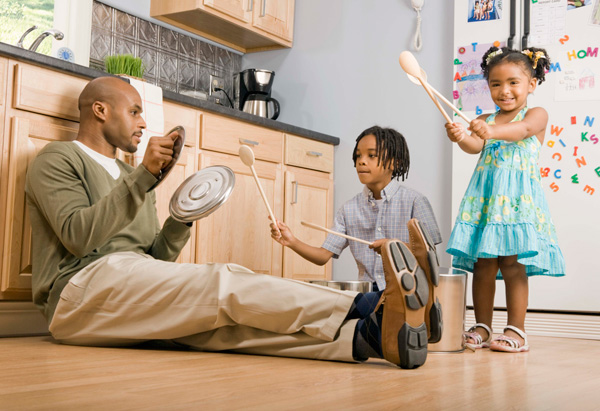Men Who Behave Dadly: The Life of the Full-Time Father
Stay-at-home dads: Some are married to women who can make more money. Others do it because they want to.

Photo: Thinkstock
When Peter Baylies founded the At-Home Dad Network in 1994, there were few resources for a full-time father like him. One day while his son John was napping, Baylies decided to start a newsletter. He began a conversation with 20 at-home dads over the Internet and asked them for submissions. "I was flooded with articles," he says. The result is a national organization for stay-at-home dads (SAHDs) with more than 50 local groups, each with 50 to 100 members, and an annual convention—held on weekends so the men can get away while their wives watch the kids.
Today, thanks to organizations like Baylies's (athomedad.com) and athomedad.org, a househusband who would have felt isolated in his own neighborhood ten years ago is no longer alone. One small sign that SAHD ranks are expanding: At restaurants and rest stops around the country, the men's room is just as likely as the ladies' room to have a Koala diaper-changing table. According to Koala's vice president Brendan Cherry, the number of new businesses ordering two tables, as opposed to one, has grown exponentially over the past five years.
Libby Gill, author of Stay-at-Home Dads: The Essential Guide to Creating the New Family, attributes the increase of SAHDs in part to economics. "Two out of five women outearn their husbands," she says. If one parent is going to care for the kids, the choice has less to do with gender than with who has the bigger paycheck and the most job security.
Men still struggle with their new role, however. "In the beginning, I had this macho thing about 'a guy's gotta work,'" says Todd Vossler, a primary caretaker of two, whose wife makes a good salary as a certified public accountant. Vossler founded a chapter of DC Metro Dads, a network for Washington-area stay-at-home fathers, which organizes lunches and play groups. "You need that adult conversation," he says.
Tom Smith, also raising two children, remembers a party he went to after moving to Brockport, New York. "An older gentleman walked up and said, 'So you must be the new professor.' I said, 'No, that'd be my wife.' 'What do you do?' he asked me. When I told him I was a stay-at-home dad, he looked at me, turned around, and walked away."
Despite stories like this—and every dad has at least one—Libby Gill thinks the stigma of being a SAHD is gradually disappearing. "There's been a shift over the last generation. It's gone from 'Jeez, I'm the weirdest guy on the planet' to 'I'm really proud of the contribution I can make to my family and to my children,'" she says. "It's becoming normalized now."
More on Dads
Today, thanks to organizations like Baylies's (athomedad.com) and athomedad.org, a househusband who would have felt isolated in his own neighborhood ten years ago is no longer alone. One small sign that SAHD ranks are expanding: At restaurants and rest stops around the country, the men's room is just as likely as the ladies' room to have a Koala diaper-changing table. According to Koala's vice president Brendan Cherry, the number of new businesses ordering two tables, as opposed to one, has grown exponentially over the past five years.
Libby Gill, author of Stay-at-Home Dads: The Essential Guide to Creating the New Family, attributes the increase of SAHDs in part to economics. "Two out of five women outearn their husbands," she says. If one parent is going to care for the kids, the choice has less to do with gender than with who has the bigger paycheck and the most job security.
Men still struggle with their new role, however. "In the beginning, I had this macho thing about 'a guy's gotta work,'" says Todd Vossler, a primary caretaker of two, whose wife makes a good salary as a certified public accountant. Vossler founded a chapter of DC Metro Dads, a network for Washington-area stay-at-home fathers, which organizes lunches and play groups. "You need that adult conversation," he says.
Tom Smith, also raising two children, remembers a party he went to after moving to Brockport, New York. "An older gentleman walked up and said, 'So you must be the new professor.' I said, 'No, that'd be my wife.' 'What do you do?' he asked me. When I told him I was a stay-at-home dad, he looked at me, turned around, and walked away."
Despite stories like this—and every dad has at least one—Libby Gill thinks the stigma of being a SAHD is gradually disappearing. "There's been a shift over the last generation. It's gone from 'Jeez, I'm the weirdest guy on the planet' to 'I'm really proud of the contribution I can make to my family and to my children,'" she says. "It's becoming normalized now."
More on Dads



